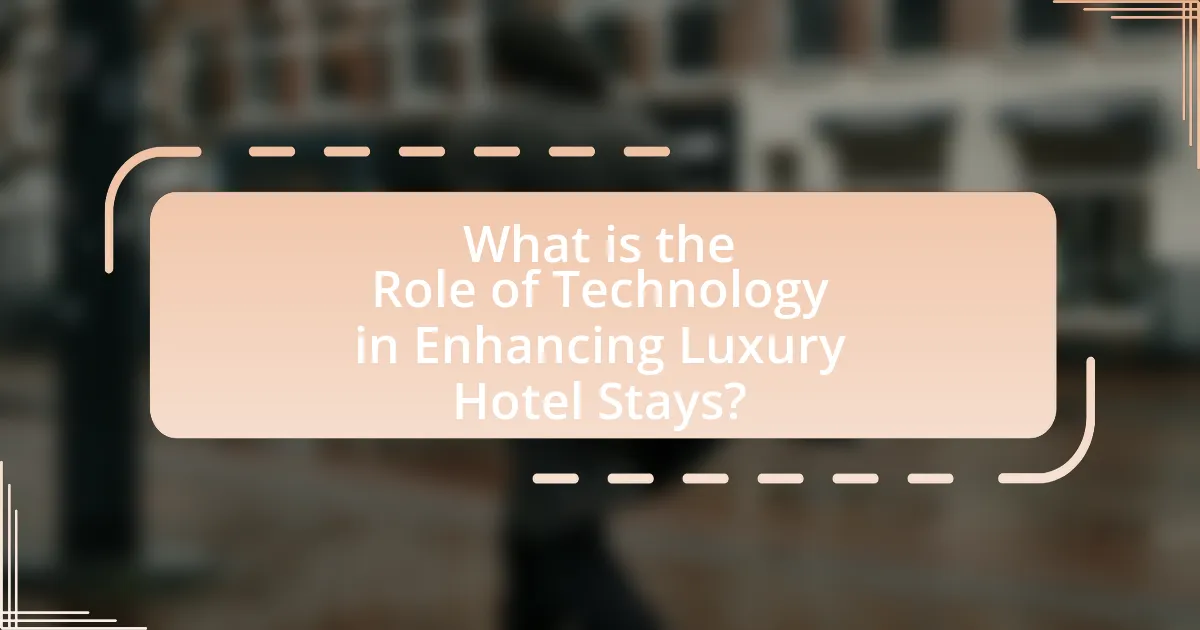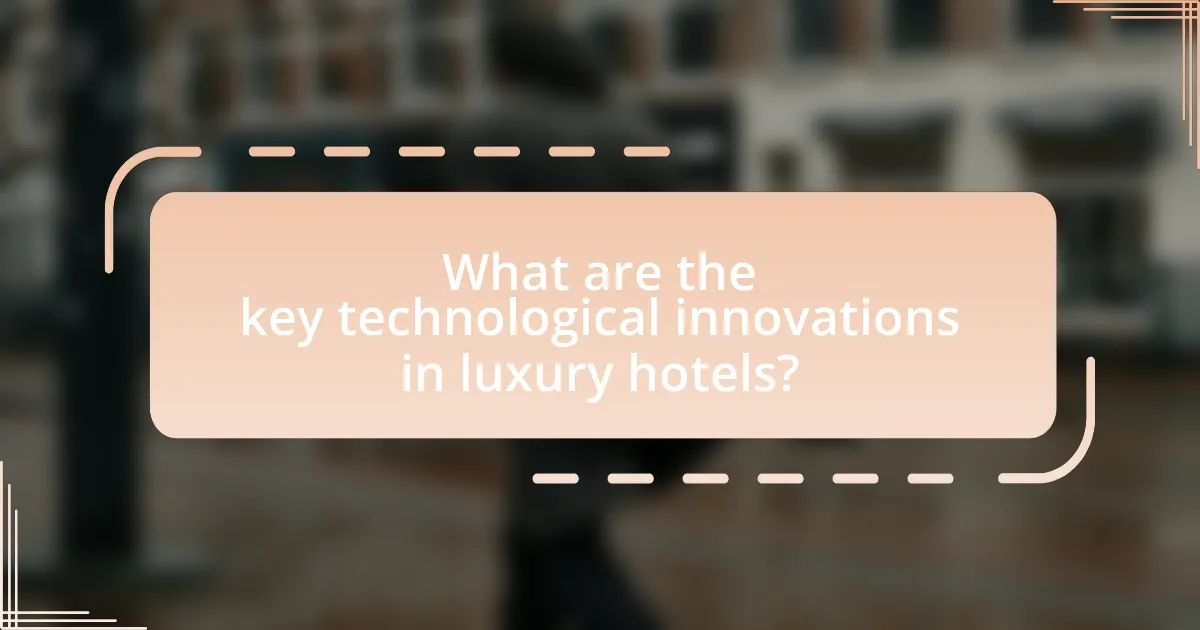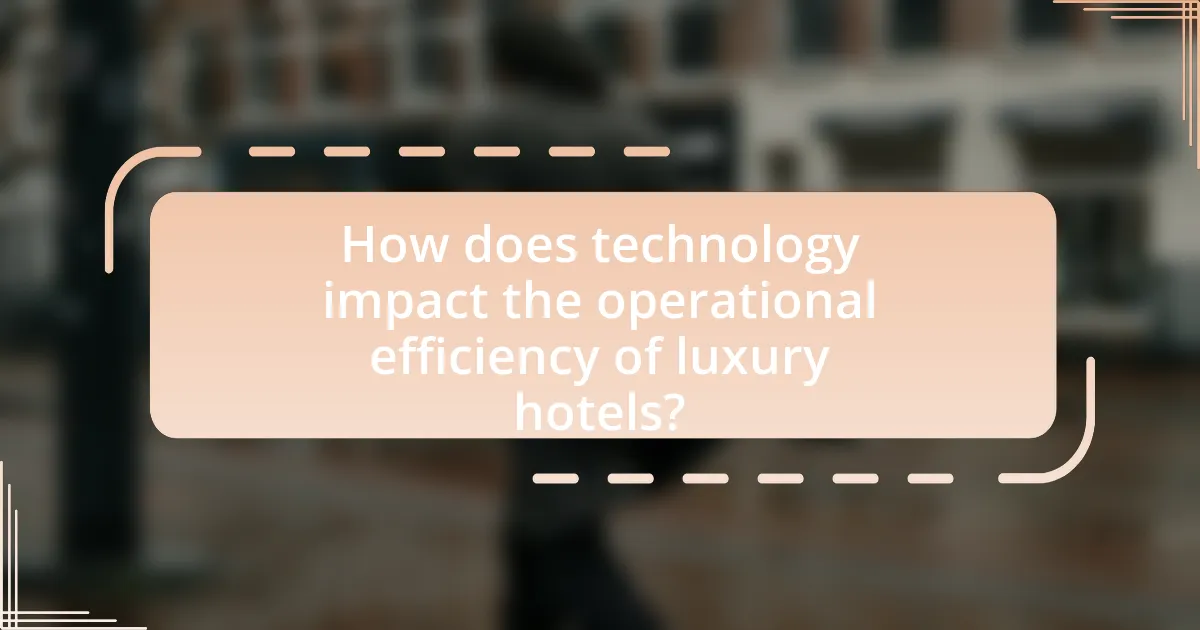The article focuses on the role of technology in enhancing luxury hotel stays, highlighting how advanced systems such as mobile check-in, smart room controls, and AI-driven concierge services cater to individual guest preferences. It discusses the transformation of the luxury hotel experience through personalization, efficiency, and guest engagement, supported by data analytics that anticipate guest needs. Key technologies, including smart room features and mobile applications, are examined for their impact on guest satisfaction and operational efficiency. The article also addresses the competitive advantages technology provides to luxury hotels, the influence on customer loyalty, and the challenges of implementation, offering best practices for seamless integration.

What is the Role of Technology in Enhancing Luxury Hotel Stays?
Technology plays a crucial role in enhancing luxury hotel stays by providing personalized experiences and streamlined services. Luxury hotels utilize advanced systems such as mobile check-in, smart room controls, and AI-driven concierge services to cater to individual guest preferences. For instance, a study by Cornell University found that 70% of guests prefer hotels that offer mobile technology for convenience, indicating a strong demand for tech integration in luxury accommodations. Additionally, the use of data analytics allows hotels to anticipate guest needs, further elevating the overall experience.
How has technology transformed the luxury hotel experience?
Technology has transformed the luxury hotel experience by enhancing personalization, efficiency, and guest engagement. Smart room controls allow guests to customize lighting, temperature, and entertainment systems through mobile apps or voice-activated devices, creating a tailored environment that meets individual preferences. Additionally, contactless check-in and mobile key systems streamline the arrival process, reducing wait times and enhancing convenience. According to a 2021 study by McKinsey, 70% of luxury hotel guests prefer digital interactions for booking and service requests, indicating a strong demand for tech-driven solutions. Furthermore, advanced data analytics enable hotels to anticipate guest needs and preferences, leading to improved service delivery and satisfaction.
What specific technologies are commonly used in luxury hotels?
Luxury hotels commonly use advanced technologies such as smart room controls, mobile check-in and check-out systems, high-speed internet access, and personalized guest experience platforms. Smart room controls allow guests to adjust lighting, temperature, and entertainment systems through mobile devices or voice commands, enhancing comfort and convenience. Mobile check-in and check-out streamline the arrival and departure process, reducing wait times and improving guest satisfaction. High-speed internet access is essential for business and leisure travelers, ensuring connectivity throughout the stay. Personalized guest experience platforms utilize data analytics to tailor services and recommendations, creating a unique and memorable experience for each guest. These technologies collectively contribute to a seamless and luxurious stay, aligning with the expectations of modern travelers.
How do these technologies improve guest satisfaction?
Technologies improve guest satisfaction by providing personalized experiences and streamlined services. For instance, mobile apps enable guests to customize their stay, from room preferences to dining options, enhancing their overall experience. Additionally, smart room features, such as automated lighting and climate control, allow guests to tailor their environment to their liking, which has been shown to increase comfort levels. According to a study by Cornell University, hotels that implement technology-driven personalization see a 20% increase in guest satisfaction ratings. This data underscores the effectiveness of technology in meeting and exceeding guest expectations.
Why is technology important for luxury hotels?
Technology is important for luxury hotels because it enhances guest experiences and operational efficiency. Luxury hotels utilize advanced technologies such as mobile check-in, smart room controls, and personalized service platforms to meet the high expectations of their clientele. For instance, a study by Cornell University found that hotels implementing mobile technology saw a 20% increase in guest satisfaction scores. Additionally, technology streamlines operations, allowing staff to focus on delivering exceptional service, which is crucial in the competitive luxury market.
What competitive advantages does technology provide to luxury hotels?
Technology provides luxury hotels with competitive advantages such as enhanced guest experience, operational efficiency, and personalized services. Enhanced guest experience is achieved through innovations like mobile check-in, smart room controls, and virtual concierge services, which streamline processes and elevate comfort. Operational efficiency is improved by utilizing property management systems and data analytics, allowing hotels to optimize staffing and resource allocation, ultimately reducing costs. Personalized services are facilitated through customer relationship management systems that analyze guest preferences, enabling tailored offerings and targeted marketing strategies. These advantages collectively position luxury hotels to attract and retain discerning clientele in a competitive market.
How does technology influence customer loyalty in luxury hospitality?
Technology significantly enhances customer loyalty in luxury hospitality by personalizing guest experiences and streamlining service delivery. Advanced data analytics allows luxury hotels to gather insights on guest preferences, enabling tailored services that meet individual needs, which fosters a sense of belonging and loyalty. For instance, a study by McKinsey & Company found that personalized experiences can increase customer satisfaction by up to 20%, directly impacting repeat bookings and brand loyalty. Furthermore, the integration of mobile apps and contactless services improves convenience and efficiency, making guests feel valued and respected. This seamless interaction not only enhances the overall experience but also encourages guests to return, as evidenced by a report from Deloitte indicating that 60% of consumers are more likely to stay loyal to brands that provide personalized experiences.

What are the key technological innovations in luxury hotels?
Key technological innovations in luxury hotels include smart room technology, mobile check-in and check-out systems, and personalized guest experiences through data analytics. Smart room technology allows guests to control lighting, temperature, and entertainment systems via mobile devices or voice commands, enhancing comfort and convenience. Mobile check-in and check-out streamline the arrival and departure process, reducing wait times and improving overall guest satisfaction. Data analytics enables hotels to tailor services and offers to individual preferences, creating a more personalized experience. According to a report by Deloitte, 70% of luxury hotel guests prefer personalized services, highlighting the importance of these innovations in meeting guest expectations.
How do smart room technologies enhance guest comfort?
Smart room technologies enhance guest comfort by providing personalized control over the room environment. These technologies allow guests to adjust lighting, temperature, and entertainment systems through intuitive interfaces, such as mobile apps or voice commands. For instance, a study by the Cornell University School of Hotel Administration found that 70% of guests prefer hotels that offer smart technology features, indicating a strong demand for personalized experiences. Additionally, smart room technologies can automate tasks like adjusting curtains or managing energy use, which not only improves convenience but also contributes to a more relaxing atmosphere.
What features are included in smart hotel rooms?
Smart hotel rooms typically include features such as automated lighting, smart thermostats, voice-activated assistants, mobile room controls, and keyless entry systems. These technologies enhance guest convenience and comfort by allowing personalized control over the room environment. For instance, automated lighting can adjust based on the time of day or guest preferences, while smart thermostats optimize energy use and maintain ideal temperatures. Voice-activated assistants, like Amazon Alexa or Google Assistant, enable guests to control various room functions hands-free. Keyless entry systems provide secure and convenient access without traditional keys. These features collectively improve the overall guest experience, aligning with the growing trend of integrating technology into luxury accommodations.
How do guests interact with smart room technologies?
Guests interact with smart room technologies primarily through voice commands, mobile applications, and touch interfaces. These technologies allow guests to control lighting, temperature, entertainment systems, and room service requests seamlessly. For instance, a study by the Cornell University School of Hotel Administration found that 70% of guests prefer using their smartphones to manage room settings, indicating a strong inclination towards mobile app integration in hotel environments. Additionally, voice-activated assistants, such as Amazon Alexa or Google Assistant, are increasingly being implemented in luxury hotels, enhancing the guest experience by providing hands-free control and personalized service.
What role does mobile technology play in luxury hotel stays?
Mobile technology significantly enhances luxury hotel stays by providing seamless guest experiences through features such as mobile check-in, room service ordering, and personalized communication. These functionalities streamline the guest journey, allowing for greater convenience and efficiency. For instance, a study by the American Hotel and Lodging Educational Institute found that 70% of guests prefer mobile check-in options, indicating a strong demand for technology that simplifies the arrival process. Additionally, mobile apps enable hotels to offer tailored services, such as customized recommendations and instant access to amenities, which cater to individual preferences and enhance overall satisfaction.
How can mobile apps improve the guest experience?
Mobile apps can improve the guest experience by providing seamless access to hotel services and personalized interactions. These applications enable guests to check-in and check-out digitally, order room service, and make reservations for amenities directly from their smartphones, enhancing convenience and efficiency. According to a study by the American Hotel and Lodging Educational Institute, 70% of guests prefer using mobile apps for service requests, indicating a strong demand for this technology. Additionally, mobile apps can offer tailored recommendations based on guest preferences, further enriching the overall experience.
What services can guests access through hotel mobile apps?
Guests can access a variety of services through hotel mobile apps, including room booking, check-in and check-out, room service ordering, and concierge services. These apps often allow guests to manage their reservations, request housekeeping, and communicate directly with hotel staff. Additionally, many hotel mobile apps provide access to amenities such as spa bookings, restaurant reservations, and local attraction information. The integration of these services enhances the overall guest experience by providing convenience and personalized options, which is essential in the luxury hotel sector.

How does technology impact the operational efficiency of luxury hotels?
Technology significantly enhances the operational efficiency of luxury hotels by automating processes and improving guest experiences. Automation tools, such as property management systems, streamline check-in and check-out procedures, reducing wait times and labor costs. For instance, a study by Cornell University found that hotels utilizing automated systems can increase operational efficiency by up to 30%. Additionally, technology facilitates better communication between staff and guests through mobile apps and messaging platforms, allowing for quicker service and personalized experiences. This integration of technology not only optimizes resource allocation but also enhances customer satisfaction, leading to higher occupancy rates and revenue growth.
What systems are used for managing hotel operations?
Property Management Systems (PMS) are primarily used for managing hotel operations. These systems facilitate various functions such as reservations, front desk operations, housekeeping management, and billing. For instance, popular PMS solutions like Opera and Maestro streamline these processes, allowing hotels to enhance efficiency and improve guest experiences. According to a report by Hospitality Technology, 70% of hotels utilize a PMS to optimize their operational workflows, demonstrating the critical role these systems play in the hospitality industry.
How do property management systems streamline hotel operations?
Property management systems streamline hotel operations by automating and integrating various tasks such as reservations, check-ins, billing, and housekeeping management. These systems enhance efficiency by reducing manual errors and saving time, allowing staff to focus on guest services. For instance, a study by the Cornell University School of Hotel Administration found that hotels using property management systems experienced a 20% increase in operational efficiency. This efficiency is achieved through real-time data access, which enables better decision-making and resource allocation, ultimately improving the overall guest experience.
What role does data analytics play in enhancing hotel services?
Data analytics plays a crucial role in enhancing hotel services by enabling personalized guest experiences and optimizing operational efficiency. By analyzing data from guest preferences, booking patterns, and feedback, hotels can tailor services to meet individual needs, such as customized room settings or targeted marketing offers. For instance, a study by McKinsey & Company found that hotels leveraging data analytics can increase revenue by up to 10% through improved customer targeting and service personalization. Additionally, data analytics helps in forecasting demand, allowing hotels to manage inventory and staffing more effectively, which leads to cost savings and improved guest satisfaction.
How can technology improve communication between staff and guests?
Technology can improve communication between staff and guests by facilitating real-time interactions through mobile applications and messaging platforms. These tools enable guests to request services, provide feedback, and communicate preferences instantly, enhancing their overall experience. For instance, a study by Cornell University found that hotels utilizing mobile communication saw a 30% increase in guest satisfaction scores, demonstrating the effectiveness of technology in bridging communication gaps. Additionally, features like chatbots and virtual assistants can provide immediate responses to common inquiries, further streamlining communication and ensuring that guests feel attended to at all times.
What tools facilitate better communication in luxury hotels?
Mobile applications facilitate better communication in luxury hotels by providing guests with instant access to services and information. These applications often include features such as room service ordering, concierge requests, and local area guides, allowing guests to communicate their needs directly to hotel staff without the need for face-to-face interaction. Additionally, messaging platforms integrated into hotel systems enable real-time communication between guests and staff, enhancing responsiveness and personalization. Research indicates that hotels utilizing mobile technology see increased guest satisfaction and operational efficiency, as reported in the “Journal of Hospitality and Tourism Technology.”
How does improved communication affect guest experiences?
Improved communication significantly enhances guest experiences by fostering clarity and responsiveness in service delivery. When hotels utilize technology such as mobile apps and instant messaging, they can provide timely information and address guest inquiries promptly, leading to increased satisfaction. For instance, a study by the Cornell University School of Hotel Administration found that effective communication strategies can boost guest loyalty and positive reviews, as guests feel valued and understood. This direct correlation between communication and guest satisfaction underscores the importance of integrating advanced communication tools in luxury hotel settings.
What are the challenges of implementing technology in luxury hotels?
The challenges of implementing technology in luxury hotels include high costs, integration complexities, and maintaining a personalized guest experience. High costs arise from the need for advanced systems and ongoing maintenance, which can strain budgets. Integration complexities occur when new technologies must work seamlessly with existing systems, often requiring significant time and expertise. Additionally, luxury hotels prioritize personalized service, and over-reliance on technology can detract from the human touch that guests expect, leading to potential dissatisfaction. These challenges highlight the need for careful planning and execution when adopting technological solutions in the luxury hospitality sector.
What are the common barriers to technology adoption in the hospitality industry?
Common barriers to technology adoption in the hospitality industry include high costs, lack of skilled personnel, resistance to change, and concerns about data security. High costs can deter hotels from investing in new technologies, as initial expenditures and ongoing maintenance can be significant. The lack of skilled personnel hampers the effective implementation and utilization of technology, as staff may not have the necessary training or expertise. Resistance to change often arises from established practices and fear of disrupting existing operations. Additionally, concerns about data security can prevent hospitality businesses from adopting new technologies, as they worry about potential breaches and the protection of customer information. These barriers collectively hinder the integration of innovative solutions that could enhance luxury hotel stays.
How can luxury hotels overcome these challenges?
Luxury hotels can overcome challenges by integrating advanced technology solutions that enhance guest experiences and streamline operations. Implementing smart room technologies, such as automated lighting and climate control, allows for personalized guest preferences, improving satisfaction. Additionally, utilizing data analytics can help hotels anticipate guest needs and optimize service delivery, leading to increased loyalty. For instance, a study by Cornell University found that hotels using data-driven insights saw a 10% increase in customer satisfaction scores. By adopting these technological advancements, luxury hotels can effectively address operational challenges while elevating the overall guest experience.
What best practices should luxury hotels follow when integrating technology?
Luxury hotels should prioritize seamless integration of technology to enhance guest experiences. This includes implementing user-friendly mobile apps for reservations and services, ensuring high-speed internet access throughout the property, and utilizing smart room technologies that allow guests to control lighting, temperature, and entertainment systems. Additionally, luxury hotels should invest in data analytics to personalize guest experiences based on preferences and past behaviors. According to a study by Deloitte, 70% of travelers prefer hotels that offer mobile check-in and keyless entry, highlighting the importance of technology in meeting guest expectations.
How can hotels ensure a seamless technology experience for guests?
Hotels can ensure a seamless technology experience for guests by implementing integrated systems that facilitate easy access to services and information. This includes providing high-speed Wi-Fi, mobile check-in and check-out options, and user-friendly interfaces for in-room technology such as smart TVs and room controls. Research indicates that 70% of guests prefer mobile solutions for check-in, highlighting the importance of mobile technology in enhancing guest satisfaction. Additionally, regular staff training on technology use and troubleshooting can further enhance the guest experience by ensuring that assistance is readily available when needed.
What strategies can enhance staff training on new technologies?
Implementing hands-on training sessions can significantly enhance staff training on new technologies. These sessions allow employees to interact directly with the technology, fostering a deeper understanding and practical skills. Research indicates that experiential learning increases retention rates by up to 75%, compared to traditional lecture-based training methods. Additionally, incorporating ongoing support through mentorship programs and access to online resources ensures that staff can continuously improve their skills and adapt to new technological advancements. This approach not only boosts confidence but also enhances overall service quality in luxury hotel settings.